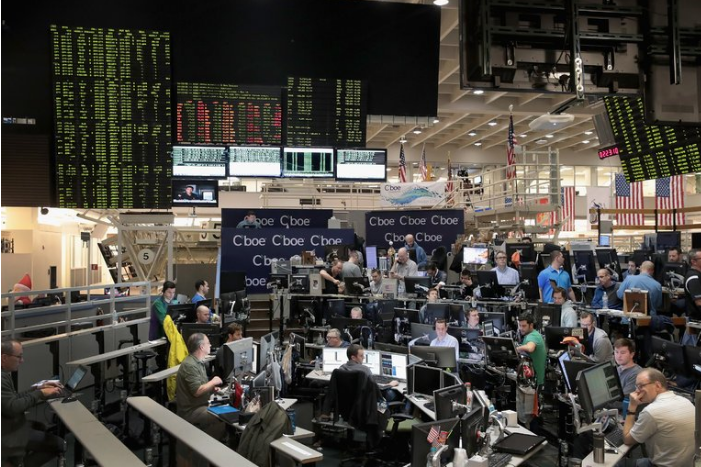What Bitcoin Reveals About Financial Markets
.png)
The spectacular increase and recent plunge in the price of Bitcoin and other cryptocurrencies have raised concerns that the bursting of the Bitcoin bubble will cause financial markets to crash. They probably won’t, but the Bitcoin bubble should finally destroy our faith in the efficiency of markets.
Since the 1970s, economic policy has been based on the idea that financial market prices reflect all the information relevant to the value of any asset. If this is true, market prices are the best estimates of the value of any investment and financial markets should be relied on to allocate capital investment.
This idea, referred to in the jargon of economics as the efficient market hypothesis (technically, the strong efficient market hypothesis), implicitly underlay the deregulation of financial markets that started in the 1970s. Although rarely stated now with as much confidence as it was during its heyday in the 1990s, the efficient market hypothesis remains a background assumption of much central-bank and economic policy.
The hypothesis survived the absurdities of the dot-com bubble in the late 1990s and early 2000s, as well as the meltdown in derivative markets that led to the global financial crisis in 2007 and 2008. Although the hypothesis should have been refuted by those disasters, it lived on, if only in zombie form.
But at least each of those earlier bubbles began with a plausible premise. The rise of the internet has transformed our lives and given rise to some very profitable companies, such as Amazon and Google. Even though it was obvious that most 1990s dot-coms would fail, it was easy to make a case for any of them individually.
As for the derivative assets that gave us the global financial crisis, they were viewed favorably in light of a widely held theory, known as the “great moderation,” that suggested that major economic crises were a thing of the past, thanks to certain systemic changes in the way developed nations ran their economies. The theory was backed by leading economists and central bankers. Asset-backed derivatives were, ultimately, a bet on the great moderation.
The contrast with Bitcoin is stark. The Bitcoin bubble rests on no plausible premise. When Bitcoin was created about a decade ago, the underlying idea was that it would displace existing currencies for transactions of all kinds. But by the time the Bitcoin bubble took off last year, it was obvious that this would not happen. Only a handful of legitimate merchants ever accepted Bitcoin. And as the Bitcoin bubble drove up transactions charges and waiting times, even this handful walked away.
For a while, Bitcoin was used for transactions that people wanted to keep secret from government authorities, like drug deals. It soon became apparent, however, that if authorities wanted to track these transactions, they could. For instance, Silk Road, the first major online drug market, which made use of Bitcoin, was shut down by the F.B.I. in 2013.
Hardly anyone now suggests that Bitcoin has value as a currency. Rather, the new claim is that Bitcoin is a “store of value” and that its price reflects its inherent scarcity. (By design, no more than 21 million Bitcoins can be created.)
Most economists, including me, dismiss this claim. And if the claim is false, Bitcoin’s value is obviously another deadly strike against the efficient market hypothesis.
But even if the claim is true, the idea that Bitcoin is valuable simply because people value it and because it is scarce should shake any remaining faith in the efficient market hypothesis.
Consider: If Bitcoin is a “store of value,” then asset prices are entirely arbitrary. As the proliferation of cryptocurrencies has shown, nothing is easier than creating a scarce asset. The same argument would apply to any existing financial assets. Any stock in the S & P 500 could be priced not in terms of future earnings prospects but on the basis that people choose to value it highly.
Suppose, more plausibly, that Bitcoin has no underlying value and will eventually become worthless. According to the efficient market hypothesis, financial markets will correctly estimate the true value of Bitcoin and will drive the price to zero immediately.
**But that hasn’t happened either. Until recently, it wasn’t even possible because the Bitcoin markets were themselves as opaque as the currency.
Now it is possible: Futures trading for Bitcoin on the Chicago Mercantile Exchange has been going on since December. But Bitcoin prices rose after the creation of futures trading and began their sharp decline only when governments took measures to limit speculation.
Current futures contracts in Bitcoin extend as far as June of this year. According to those contract prices, the market expects Bitcoin to retain its value well into the future.
Whatever happens to Bitcoin, we must not lose sight of a more fundamental — and more worrisome — development: A financial product with a purely arbitrary value has been successfully introduced in the world’s most sophisticated financial markets.
Bitcoin probably won’t bring financial markets crashing down. But it shows that regulators need to cut those markets down to size.**